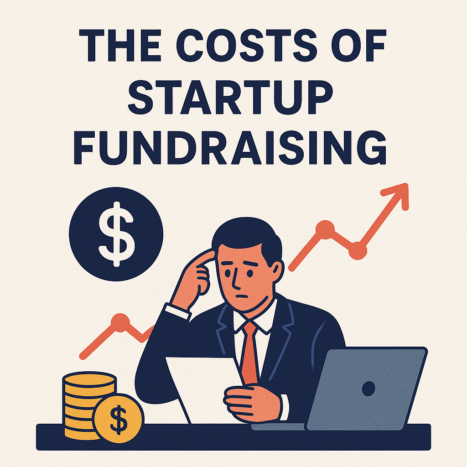⚠️ Beyond the Investment: What Startup Fundraising Really Costs You
The Real Price of Raising Capital for Startups
Securing capital marks a defining milestone in every startup’s growth path. While attention often gravitates toward the headline valuation and total funds raised, it’s equally important to understand the actual cost of reaching that milestone.
Recognising these expenses isn’t merely about accounting accuracy — it’s about empowering founders to make informed financial and strategic choices.
Each phase of fundraising comes with its own financial commitments, and these must be anticipated well in advance. The reality is that many of these costs are borne by the startup, whether or not the deal eventually materialises. Proper planning helps safeguard liquidity and ensures the company remains financially stable throughout the fundraising journey.
Key Insight
Raising money can be expensive — and if unmanaged, these costs can quietly consume a notable portion of the very funds you aim to secure.
Expenses such as advisory retainers, legal and diligence fees, marketing costs, and months of lost operating focus can add up quickly. Without careful management, these can strain working capital and delay business progress.
Startup Fundraising Expenses
So, what exactly should founders plan and budget for? Let’s break it down.
1. Upfront Advisory Fees and Retainers
The first expense comes from hiring external experts — placement agents, venture advisors, or fundraising consultants. These professionals often charge monthly retainers to structure your raise, prepare materials, and coordinate investor outreach.
As of 2025, retainers generally range between £2,000 and £10,000 per month, lasting up to a year for larger rounds. Additionally, one-time engagement fees of 2%–5% of the fundraising target are often included.
💡 Tip: Always request a clear deliverables list — such as investor meetings or valuation reports — tied directly to any advance payments. Transparency ensures accountability and value.
2. Success Fees or Commissions
Nearly all intermediaries charge a success-based commission, usually between 3%–7% of total funds raised. On a £1 million round, a 5% fee means £50,000 payable upon closing.
Check whether the commission applies to gross commitments or the net received after deductions, and confirm whether it’s due on signing or on fund transfer.
3. Legal & Advisory Costs
Legal counsel is essential for drafting, reviewing, and negotiating term sheets. Expect to spend between £5,000 and £20,000 depending on deal complexity.
In some cases, investors may ask startups to cover a portion of their legal expenses — adding another £10,000 to £30,000. While cutting corners may seem tempting, solid legal advice protects against future liabilities.
4. Due Diligence Expenses
Investors conduct due diligence covering financial audits, IP verification, and compliance checks. While investors lead the process, startups often pay for supporting reports — ranging from £2,000 to £10,000.
Typical reimbursable costs include accounting verification, IP audits, and secure data room setup for document sharing.
5. Marketing & Investor Material Costs
A strong pitch requires professional storytelling. External support for pitch decks, videos, and financial models can cost:
-
Deck design: £1,000–£5,000
-
Investor video: £2,000–£10,000
-
Financial modelling: £1,000–£5,000
Though optional, polished materials can increase investor engagement by 20–30%.
6. Travel & Investor Meetings
Despite digital tools, many investors prefer in-person meetings. Factor in £1,000–£5,000 for travel, accommodation, and event participation.
7. Time & Opportunity Costs
Fundraising can take 3–9 months — time the founder could otherwise spend on customers or product development. This hidden cost often outweighs direct expenses and must be acknowledged in strategic planning.
8. Post-Funding Obligations
Even after funding closes, administrative and investor management costs persist — such as board meetings, statutory filings, and audit requirements. These recurring commitments should be part of your long-term forecast.
Budgeting Smartly for Fundraising
-
List every cost: Treat fundraising as its own project with a detailed budget.
-
Demand transparency: Get written confirmation of all fees and conditions from intermediaries.
-
Negotiate structure: See if retainers can be adjusted against final fees or legal costs capped.
-
Add a buffer: Always include a 10–20% contingency for unforeseen expenses.

